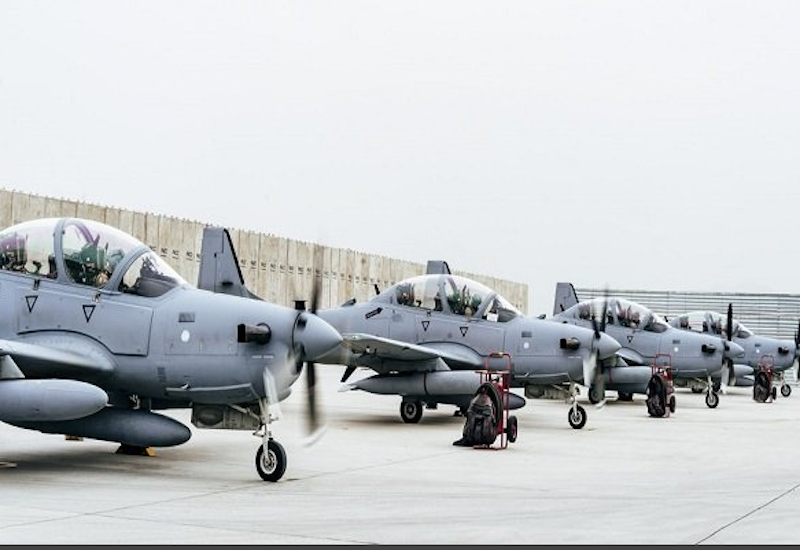
By Kingsley Nwezeh:
The federal government has so far procured 37 fighter jets and attack helicopters from United States and Italy, in a renewed bid to boost the fighting capacity of the air component of the military establishment.
Beyond the 12 A-29 Super Tucano fighter planes earlier procured from the United States last year, the State Department had in April, also approved the sale of 14 attack helicopters to replenish the arsenal of the Nigerian Air Force.This comes as military authorities said at the weekend that no Nigerian territory was under the control of terror group, Boko Haram or any other group for that matter.
THISDAY gathered that talks between officials of the Ministry of Defence (MoD) and Italian officials have reached an advanced stage for the procurement and delivery of 24 fighter jets.The attack aircraft are expected to replace aging Alpha jets of the Nigerian Air Force which were involved in recent air mishaps.THISDAY further learnt that Nigeria had taken delivery of 10 J-7 fighter planes procured from China.
The fighter planes are presently being coupled at the Nigerian Air Force Base in Markurdi, Benue State, even as 200 pilots have so far undergone training in United States, United Kingdom, South Africa and Egypt, as part of the capacity building strategy of the Nigerian Air Force.Other aircraft purchased by government include L-39s, JF-17 and C-130.
This comes as spokesman of the Nigerian Air Force, Air Commodore Edward Gabkwet, said the federal government between 2015 and 2022, procured over 40 brand new aircraft with more than 50 fighter aircraft in the arsenal of the air force and ready for deployment.He said the military was prepared for any eventuality.
He stated that under the present administration, “the military has never had it so good,” in terms of rearmament.He stated that under the Chief of Air Staff, Air Marshal Oladayo Amao, the air force had sustained a 75 per cent serviceability status of the NAF air fleet.Gabkwet said the situation had greatly improved the joint operations of the armed forces led by the Chief of Defence Staff, Gen. Lucky Irabor as well as the response time in emergency calls for air support and air interdiction in the fight against insurgency and armed banditry.
“There is great improvement in joint operations which is key to our operations. Reaction time in the case of ambush has greatly improved.“When there is an ambush from nowhere, the jet fighters will appear. This can be seen in the number of insurgents, who have surrendered,” he said.The federal government had ordered the procurement of 24 M-346 Master aircraft from Italian aircraft maker, Leonardo.
The attack aircraft was worth an estimated €1.2 billion and would see the Italian jets replacing the aging Dassault Alpha Jet A/E in use by the Nigerian Air Force.Leonardo would provide aircraft, training, support, and munitions for Nigeria as part of a sole-source.As a partnership, the Italian Air Force would train the Nigerian Air Force pilots at the International Flight Training School of Galatina (Lecce) and Decimomannu airbase (Sardinia) in Italy.
The United States government had in April approved the sale of advanced attack Bell AH-1Z Viper helicopters worth nearly $1 billion.The State Department had announced the approval of the $997 million sale of 24 Bell AH-1Z Viper helicopters and related equipment to Nigeria.The related equipment included guidance, night vision and targeting systems as well as engines and training support, the department had said in a notice to Congress.
Meanwhile, military authorities said at the weekend that no Nigerian territory is under the control of terror group, Boko Haram or any other group for that matter.It said military firepower was hitting the insurgents hard and forced the terrorists to seek refuge in the forests and other ungoverned spaces including the Lake Chad area.
Speaking in an interview with BBC Hausa Service, the Theater Commander, Operation Hadin Kai, Major Gen. Christopher Musa, said the superior firepower of the military was unleashed on the insurgents resulting in the death of many of them.
“Periodically, those, who managed to escape the firepower come out from hiding to operate and rush back to their base for refuge. Nevertheless, we are working with the police and other security forces to fish them out and soon we would do that.
“However, we have, before now, extended an olive branch to them, to the insurgents that any one that surrenders willingly, we would accept and enlist them for rehabilitation and reintegration programmes but that would not be same experience for anyone we caught in the cause of our operations,” he said.He affirmed that the heat of the firepower which led to death of thousands of the terrorists contributed to the increase in the return of abducted Chibok girls and other women and children held in captivity by Boko Haram.
“This year alone, we have rescued nine of the remaining Chibok girls who were abducted on April 14, 2014. What helped us was that in addition to the sustained firepower unleashed on the Boko Haram fighters the rain has also played a significant role so far. It made their place of abode uncomfortable.
“Before now, responses are always slowed down during the rainy season. But we refused to slow down this time. We have invaded their camps and killed as many as we could and that opened the window of opportunity for the women to escape because these women, originally, were not meant to be there, as they were forcefully abducted from their homes and schools and taken to the camps to serve the insurgents,” he said.










